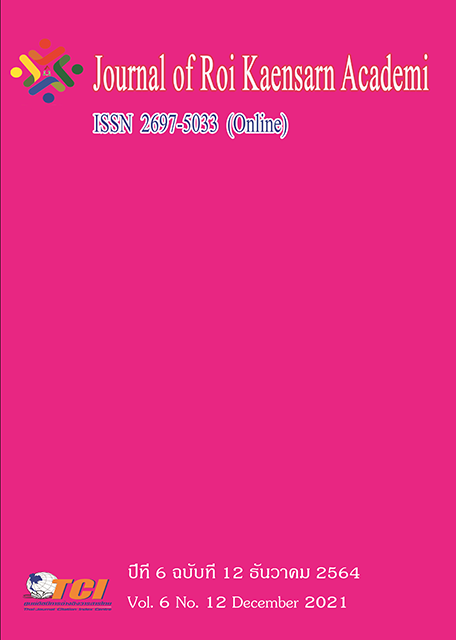อิทธิพลของสภาพแวดล้อมภายนอก วัฒนธรรมองค์กรและกลยุทธ์องค์กรที่ส่งผลต่อความเสี่ยงของบุคลากรในอุตสาหกรรมชิ้นส่วนยานยนต์ ในนิคมอุตสาหกรรม จังหวัดชลบุรี
Main Article Content
บทคัดย่อ
การวิจัยนี้มีวัตถุประสงค์ 1) เพื่อศึกษาอิทธิพลของสภาพแวดล้อมภายนอก วัฒนธรรมองค์กร และกลยุทธ์องค์กรที่ส่งผลต่อความเสี่ยงของบุคลากร 2) เพื่อตรวจสอบความสอดคล้องที่พัฒนาขึ้นกับข้อมูลเชิงประจักษ์ โดยใช้วิธีการวิจัยเชิงปริมาณ (Quantitative Method) ซึ่งเก็บรวบรวมข้อมูลจากผู้บริหารระดับสูงและผู้จัดการแผนกที่ตั้งอยู่ในบริษัทผลิตชิ้นส่วนยานยนต์ในนิคมอุตสาหกรรม จังหวัดชลบุรี จำนวน 456 บริษัทและได้รวบรวมข้อมูลจากตัวอย่างจำนวน 196 คน โดยใช้ในวิธีการเลือกตัวอย่างแบบสะดวก (Convenience Sampling) ด้วยแบบสอบถามการวิเคราะห์ข้อมูล โดยค่าร้อยละ ใช้โมเดลวิเคราะห์เส้นทาง
ผลการศึกษาพบว่า (1) ผลการวิเคราะห์เส้นทางอิทธิพลระหว่างตัวแปรแฝงภายนอก พบว่า สภาพแวดล้อม ภายนอกส่งอิทธิพลทางตรงในเชิงบวกต่อความเสี่ยงของบุคลากร ค่าสัมประสิทธิ์เส้นทาง เท่ากับ 0.215**, วัฒนธรรมองค์กรส่งอิทธิพลทางตรงในเชิงลบต่อความเสี่ยงของบุคลากร และมีค่าสัมประสิทธิ์เส้นทาง เท่ากับ -0.184**, กลยุทธ์องค์กรส่งอิทธิพลทางตรงในเชิงลบต่อความเสี่ยงของบุคลากรและมีค่าสัมประสิทธิ์เส้นทาง เท่ากับ -0.345** (2) ผลการวิเคราะห์เส้นทางความสอดคล้องกับข้อมูลเชิงประจักษ์อยู่ในเกณฑ์ดี ซึ่งแสดงให้เห็นว่าสามารถนำไปประยุกต์ใช้ได้จริง โดยมี c2= 62.19, df = 74, c2/df = 0.840, p-value = 0.835, RMSEA = 0.000, GFI = 0.962, AGFI = 0.930 ตัวแปรทั้งหมดในโมเดลสามารถร่วมอธิบายความเสี่ยงของบุคลากร ได้ร้อยละ 31.80
Article Details
เอกสารอ้างอิง
กระทรวงอุตสาหกรรม. (2559). ยุทธศาสตร์การพัฒนาอุตสาหกรรมไทย 4.0. ระยะ 20 ปี พ.ศ 2560-2579.
ชนินารถ ชิยางคบุตร และ นวลฉวี แสงชัย. (2554). ทิศทางการบริหารทรัพยากรมนุษย์เพื่อรองรับปัญหาแรงงานของภาคอุตสาหกรรมรถยนต์ในประเทศไทย .วารสารวิทยาลัยบัณฑิตศึกษาการจัดการ. มหาวิทยาล้ยขอนแก่น. 4 (2), 63-88
นริศ เพ็ญโภไคย, อดิศักดิ์ จันทรประภาเลิศ และ ธีรัตม์ พิริยะพลิน. (2558). ผลกระทบของความเสี่ยงคนในองค์การที่ส่งผลต่อประสิทธิผลองค์การ. วารสารวิทยาลัยพาณิชยศาสตร์บูรพาปริทัศน์. 10 (2), 72-90.
สุภมาส อังศุโชติ, สมถวิล วิจิตรวรรณา และ รัชนีกูล ภิญโญภานุวัฒน์. (2554). สถิติวิเคราะห์สําหรับการวิจัยทางสังคมศาสตร์และพฤติกรรมศาสตร์ : เทคนิคการใช้โปรแกรม LISREL. (พิมพ์ครั้งที่ 3). กรุงเทพมหานคร:
สุวิมล ติรกานนท์. (2555). การวิเคราะห์ตัวแปรพหุในงานวิจัยทางสังคมศาสตร์. (พิมพ์ครั้งที่ 2). กรุงเทพมหานคร: โรงพิมพ์แห่งจุฬาลงกรณ์มหาวิทยาลัย.
สานักงานพัฒนาวิทยาศาสตร์และเทคโนโลยีแห่งชาติ. (2560). อุตสาหกรรมยานยนต์ไฟฟ้า. ฝ่ายวิจัยนโยบาย สำนักงานพัฒนาวิทยาศาสตร์และเทคโนโนโลยีแห่งชาติ.
สำนักงานคณะกรรมการส่งเสริมการลงทุน. (2559). เขตพื้นที่เศรษฐกิจพิเศษภาคตะวันออกเพื่ออนาคตภาคตะวันออก. ออนไลน์. สืบค้นเมื่อ 30 มีนาคม 2564. แหล่งที่มา: https://www.boi.go.th/upload/content
อธิวัฒน์ ศรีวิไล. (2558). การศึกษาผลกระทบของยานยนต์ไฟฟ้าประเภทรถยนต์ต่อการใช้พลังงานของประเทศไทย. วิทยานิพนธ์วิศวกรรมศาสตร์มหาบัณฑิต. บัณฑิตวิทยาลัย: มหาวิทยาลัยธรรมศาสตร์.
Aree, S., Zain, M. & Razalli, R. M. (2010). Influence of leadership competency and Organizational culture on responsiveness and performance of firms, International Journal of Contemporary Hospitality Management . 22 (4), 500- 516.
Cameron, E., & Green, M. (2015). Making sense of change management: A complete guide to the models, tools and techniques of organizational change. (4th ed.). London: Kogan
Flouris, T. & Yilmaz, K. A. (2010). The Risk Management Framework to Strategic Human.
International Research. Journal of Finance and Economics.
Kogus, B. (1985). Designing Global Strategies: Comparative and Competitive Value-Added Chains. Magazine: Summer, July.
Lin, w, J., & Hwang, I, M., (2010). Audit Quality, Corporate Governance and Earnings Management:
A Meta-Analysis. International Journal of Auditing. 14 (1, 57-77
Porter, M. E. (2005). The competitive advantage creating and sustaining superior performance. New York: The Free Press.
Schuler, R.S. & Jachson, S.E. (1987). Linking Competitive Strategies with Human Resource Management Practices. The Academy of Management Executive. 3, 207-219.
Tiwari, P. (2009). Impact of Nature of Ownership of Banks & Demographic Variables on HRM Practices : An Empirical Study. 9th global conference on business & economic, Cambridge University, UK.

